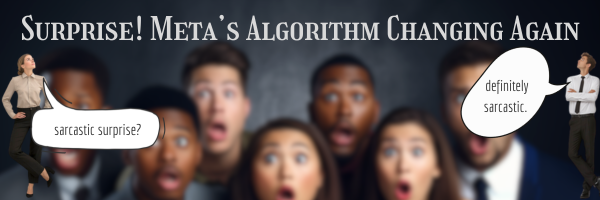Navigating Meta & Digital Advertising: Leveraging Organic Social Media and Google Grant in 2024
In the ever-evolving world of digital marketing, it’s all about keeping up with the latest trends, right? And guess what – Meta is making changes. I’ll hold for your gasp of surprise and shock…
… ok, so there was no gasp, no shock. Changes to the Facebook/Instagram algorithm happen so frequently that no one is surprised. Nevertheless, 2024 could be a notable year in the world of digital marketing. If you’re part of a nonprofit, or you’re in the business of making a positive impact on people’s lives, then now is the time to really focus heavily on organic social media, and the Google Grant could be a game-changer.
Understanding the Facebook Algorithm Changes for 2024
The Facebook algorithm is constantly evolving, with a notable shift in 2024 towards prioritizing meaningful interactions and personalization through artificial intelligence (AI). Here are key changes to be aware of:
- More Focus on Meaningful Interactions
Facebook aims to boost posts that spark conversations and generate meaningful interactions. Non-engaging content might see a decrease in reach.
- Relevance Score Calculation
The algorithm calculates a relevance score for each post, influencing content ranking based on factors like content type, user interactions, and viewing time.
- Predicted Time Spent on a Post
AI predicts user engagement by analyzing past interactions, providing insights into the expected time users might spend on a post.
- Likelihood of Engagement
Predictions on user engagement with a Page or post, considering past interactions, time spent on similar posts, and overall activity on Pages.
- Balanced Mix of Content Types
Ensuring users see a variety of post types, maintaining a diverse content experience.
- Worthiness of a Post
Factors like shares, reactions, and the credibility of the post’s author determine its perceived worthiness.
- Transparency and Control for Users
Facebook introduces features like the “Show More, Show Less” tool, allowing users to customize their feed, switch to a chronological feed, and create a “Favorites” list for preferred content.
Navigating Meta’s Changes with Organic Social Media and Google Grant
As Meta’s ad-free social media experience unfolds in Europe, nonprofits and organizations focused on helping others can rise above these changes by emphasizing organic social media and leveraging the Google Grant. Here’s why:
AI-Powered Personalization
With Meta’s increased reliance on AI, understanding your audience becomes paramount. Craft content that resonates with your community’s preferences.
Strategic Content Creation
Prioritize posts that encourage conversations and meaningful interactions to align with the updated algorithm’s preferences.
Google Grant for Nonprofits
If your nonprofit is relatively young in the digital community, meaning that you have had little opportunity to grow your audience, then you may find it difficult to grow your organic exposure right away. Make the most of the Google Grant for nonprofits to enhance online visibility faster. If you need more information about the Google Grant, you can contact us or read a little more here. Leverage this opportunity to reach a wider audience and amplify your impact.
Diversified Content Strategy
Create a balanced mix of content types, including videos, photos, links, and text posts, aligning with Meta’s algorithm preferences.
Data-Driven Decision Making
Regularly analyze insights and metrics to refine your strategy. Understand what content resonates the most and adjust your approach accordingly.

